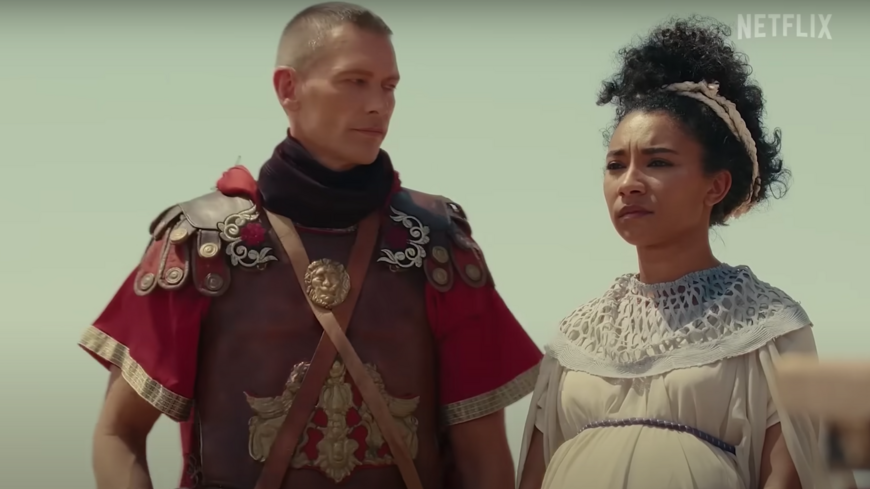CAIRO — An Egyptian lawyer is suing Netflix over its new series “Queen Cleopatra” for depicting the historical figure from ancient Egypt as a Black woman, and having a Black actress, Adele James, perform the title role.
The Egypt Independent reported on Tuesday that lawyer Mahmoud al-Semary filed a case with Egypt’s public prosecutor, demanding “serious legal action” against Netflix, and the blocking of the platform in Egypt.
“Most of what the Netflix platform displays contradicts Islamic and societal values and principles, especially Egyptian ones,” the complaint said. It accused Netflix of promoting “Afrocentrism,” which it alleged would erase Egyptian identity.
"In order to preserve the Egyptian national and cultural identity among Egyptians all over the world and take pride in it, and to consolidate the spirit of belonging to the homeland, and accordingly we ask and seek you to take the necessary legal measures against this platform,” the complaint read.
Egypt saw similar uproar in February that led to the cancelation of American comedian Kevin Hart’s first performance in the country after referencing its Black history.
Hours after the official trailer “Queen Cleopatra” was released last week, the new Netflix docuseries sparked a wave of controversy in Egypt.
The series, produced and narrated by Jada Pinkett Smith and written by Peres Owino and NneNne Iwuji, explores the life of Egypt's last pharaoh, Queen Cleopatra VII Philopator, and her fight to protect the throne, her family and legacy. Cleopatra’s reign is seen as a monumental historic period, not least because after her death the Roman Empire took control of the country.
James stars as Queen Cleopatra, British actor John Partridge plays Julius Caesar and Welsh actor Craig Russell plays Cleopatra's lover Marc Antony.
The docudrama series, which includes four episodes and which will be streamed May 10, shows the queen of the Ptolemaic Kingdom of Egypt who ruled from 51 to 30 B.C. — and her royal family — as Black. That was enough to cause a wide controversy on social media, especially in Egypt and Greece. Over 85,000 people worldwide signed a petition created by Egyptians in less than two days to cancel the new documentary for allegedly “falsifying history” by depicting Cleopatra as a Black person, despite the historical figure being of Greek descent. The petition has been removed from the change.org platform.
The question of Cleopatra's descent has long been a topic of debate among scholars. While historians generally agree that her family roots can be traced primarily to Macedonian Greece, some argue that she may have been part North African. A 2009 BBC documentary claims that recent archaeological finds in Turkey indicate the queen's mother had an "African skeleton."
Archaeologists who spoke to Al-Monitor argued that although some Black pharaohs ruled Egypt, Cleopatra was certainly not Black. Egypt's former Antiquities Minister Zahi Hawass stressed that the series is misrepresenting facts of ancient Egyptian history.
“Cleopatra was Greek and she was similar to the queens and princesses of Macedonia who were blond, not black,” he told Al-Monitor. “If we look at the massive figure of Cleopatra and her son [from] Julius Caesar, Caesarion, on the south wall of the Temple of Hathor in Dendera and her coins, there's no evidence that she was Black.”
“During the 25th Dynasty, the Kush Kingdom ruled Egypt and [the kings of Kush] were Black pharaohs but they had nothing to do with ancient Egyptian civilization,” Hawass added.
Queen Cleopatra has been depicted multiple times in Hollywood: Elizabeth Taylor played her as a temptress in the big budget 1963 film titled “Cleopatra”; Vivien Leigh played her in the 1945 film “Caesar and Cleopatra”; and Sophia Loren took on the role in “Due notti con Cleopatra” ("Two Nights with Cleopatra") in 1954.
The docuseries “Queen Cleopatra” is part of Pinkett Smith’s project "African Queens,” which includes several mini series exploring the lives of African queens.
“This particular project went through many different machinations. … I really wanted to represent Black women,” Pinkett Smith, wife of Hollywood actor Will Smith, told the Netflix Tudum festival back in February.
“We don’t often get to see or hear stories about Black queens, and that was really important for me, as well as for my daughter, and just for my community to be able to know those stories because there are tons of them!” she said.
In the Netflix trailer, Pinkett Smith serves as a narrator for the show. “There was a time long ago when women ruled with unparalleled power as warriors, queens and mothers of nations and there were none more iconic than Cleopatra,” she is heard saying. Then James, as Cleopatra, asks, “I would die for Egypt. What would you die for?”
Some excerpts of the interviews with historians were shown in the trailer. “I imagine her to have curly hair like me and similar skin,” one of them said.
Another told a similar anecdote: “I remember my grandmother saying to me, 'I don’t care what they tell you in school: Cleopatra was Black!’”
Many Egyptian Twitter users elicited a strong backlash to the cast of the series that pushed James to take to Twitter. “This kind of behavior won’t be tolerated on my account. You will be blocked without hesitation!!!” she wrote.
“If you don’t like the casting, don't watch the show. Or do & engage in (expert) opinion different to yours. Either way, I’m gassed and will continue to be!” she added.
Hawass said the series is produced by an afterthought of bad faith as a part of the Afrocentric claims that the Pharaonic civilization belongs ethnically and historically to the peoples in the south of Africa.
He refers to a trend that has emerged in recent years, led by Black African Americans and Black people in South America, claiming that the Egyptian civilization is of Black origin.
Hawass called to take a stand against the Netflix platform, stressing that Cleopatra wasn’t Black.
In February, American comedian Kevin Hart’s first performance in Egypt was canceled after he claimed that ancient Egyptians were Black.
The race of ancient Egyptians has been the subject of debate for decades. The theory that ancient Egyptians were Black was pioneered by Senegalese historian Cheikh Anta Diop in the 20th century.
Armenian-German Egyptologist Hourig Sourouzian spoke to Al-Monitor about the debate. “Egypt has African roots, but it does not mean that all pharaohs were Black,” she said. “Cleopatra was Greek, she was certainly not Black.”
“We all respect the African impact on Egypt, but the Egyptian civilization is special,” Sourouzian added.
Meanwhile, some archaeologists and historians say that the movements such as Afrocentrism and Eurocentrism affect the real transmission of history in support of a particular ethnic cause.
Yet some historians argue that modern racial identities cannot be applied when it comes to these ancient peoples.
Prominent Egyptian archaeologist Monica Hanna said that "the question about ancient Egyptians’ color is wrong.”
She told Al-Monitor that ancient Egyptians included princesses and queens that had different skin colors such as Queen Ahmose-Nefertari, the wife of King Ahmose. “We have to look at the ancient Egyptian civilization as a multiple heritage,” she said.
From Executive Producer @jadapsmith comes a new docuseries exploring the lives of iconic African queens.
QUEEN CLEOPATRA follows the story of Cleopatra, one of the world’s most famous and misunderstood woman.
QUEEN CLEOPATRA is available to stream May 10 only on Netflix pic.twitter.com/0oDUSi8Add— Strong Black Lead (@strongblacklead) April 12, 2023
“There is a new Egyptian generation that wants to know more about ancient Egypt and leading campaigns such as the Egyptian identity movement,” Hanna noted.
“This movement focuses on erasing any historical periods that passed through Egypt, such as the Greco-Roman, Byzantine and Arab civilizations, and considers them occupation,” she explained.
“By contrast, the believers and supporters of Afrocentrism use ancient Egyptian history as the only way to create a cultural identity and use the color issue to do this,” Hanna added.
To face this controversy, Hanna said that the Egyptian government should encourage scientific research and allow DNA research for ancient Egyptians to document all Egyptian heritage with its different ages and cultural diversity.
At the same time, she stressed the need to help African countries restore their historical legacy and build museums to their heritage and authentic culture.







